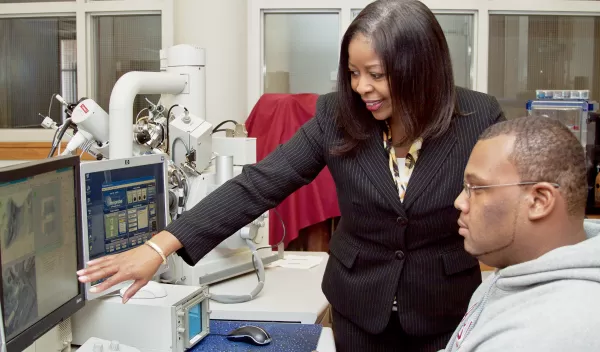
Mentor inspires bold change in STEM studies at historically black colleges and universities
Metallurgical and materials engineer Viola Acoff has more than 20 years of experience broadening participation in science, technology, engineering and mathematics (STEM). Her efforts to spark interest in materials science and engineering among students at historically black colleges and universities (HBCUs) are transforming how these minority-serving institutions approach her field.
Before Acoff began her work, undergraduate curriculum in science and materials engineering -- the discovery and design of new materials -- was almost nonexistent at HBCUs. Over 12 years, however, Acoff helped the discipline take root at many of the nation's HBCUs by designing a program to introduce faculty to the subject and help them incorporate aspects of it into their science and math courses. The National Science Foundation (NSF) partially funded her work through an award from its Mathematical and Physical Sciences Directorate. NSF's Education and Human Resources Directorate awarded her two additional grants in 2017 to further broaden participation.
During those 12 years, Acoff and her team hosted 285 HBCU faculty from 82 of the nation's 101 HBCUs and predominantly black institutions on The University of Alabama campus. Participants came from 22 states, the District of Columbia and the U.S. Virgin Islands. Several institutions -- Albany State University, Spelman College, Morehouse College and Xavier University -- have developed courses in materials science, and The University of Alabama institutionalized Acoff's program.
These developments signal increasing interest in materials science and engineering on HBCU campuses as their faculty acquire the skills to attract and retain more undergraduate and graduate students in STEM disciplines.
"By introducing science faculty from HBCUs to the field of materials science and engineering, it is anticipated that this might transform STEM education at HBCUs and ultimately in the larger society," said Acoff. Such training would enhance the U.S.'s competitive edge as researchers design more materials-based products for the global marketplace, she said.
As a result of the program, six students from participating HBCUs enrolled in graduate STEM programs at The University of Alabama. Three earned doctorate degrees in materials science, and two more are expected to earn their doctorates in materials science by 2020. One student received a master's degree in metallurgical engineering.
Acoff, the ninth of 10 children, attributes her path in mentoring to the leaders in her community who served as mentors growing up.
"A major outcome of their mentoring is that I developed a strong desire to mentor and positively impact the lives of others," said Acoff, who encourages students from underrepresented groups to pursue and succeed in STEM studies. "Very early in life, I made it my personal mission to do whatever I can to increase diversity in STEM."
Acoff is an associate dean for undergraduate and graduate programs at The University of Alabama. She has a doctoral degree in materials engineering and specializes in welding metallurgy, physical metallurgy, additive manufacturing and materials characterization using electron microscopy. She served as an organizer for The Minerals, Metals and Materials Society's firstSummit on Creating and Sustaining Diversity in the Minerals, Metals, and Materials Professions, which was held at the National Academy of Sciences in Washington, D.C. in 2014.


